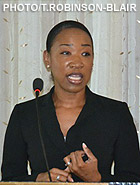| Source: Date: Updated: |
TheBahamasInvestor.com
Thursday, June 28, 2012 Thursday, June 28, 2012 |
A little more than a month on from a general election, financial services providers were urged this week to update their politically exposed persons (PEPs) list in line with new Financial Action Task Force (FATF) regulations.
The revised FATF recommendations of February 2012, now include domestic politicians in their definition of PEPs.
According to Tangela Hamilton, chief compliance and control officer at Fidelity Bank & Trust, one of the challenges The Bahamas faces is identifying PEPs locally and internationally.
Stepping up the fight against money laundering and terrorist financing earlier this year, FATF issued revised recommendations to its member countries in a bid to provide authorities with a stronger framework to act against criminals and address new threats to the international financial system.
In line with the FATF guidelines, PEPs are current or former senior officials in the executive, legislative, administrative, military, or judicial branch of government.
In addition to performing normal customer due diligence measures, FATF has asked financial institutions to have appropriate risk-management systems in place when dealing with elected officials.
Additionally, financial institutions were asked to obtain senior management approval for establishing (or continuing, for existing customers) business relationships; take reasonable measures to establish the source of wealth and source of funds to ensure they have not been derived from a corrupt source; and conduct enhanced, ongoing monitoring of the business relationship.
“As you revise your PEP list for 2012 as a result of the 2012 election, consider that includes both the PEP, as well as their immediate family members and close associates,” Hamilton told delegates attending a one-day fraud and anti-money laundering seminar hosted by the Institute of Internal Auditors (IIA) Bahamas Chapter June 26.
Hamilton said some financial service providers might be proactive and start to include new government officials on their institution’s PEP list. Strictly speaking, she said they should be included after a year of holding elected post.
“For those persons demitting office they need to stay on that list for another year and longer if need be, if you feel that there’s significant risk,” the CPA advised.
Hamilton urged financial services providers to consider how PEPs are classified in their institution’s anti-money laundering risk assessment and to continuously keep abreast of current political standing locally and internationally in order to assess whether persons are on, or off, the PEPs list.
“Financial institutions need to be able to justify their understanding of all significant transactions for PEPs that are a part of their clientele,” she said. “That was a particular point in the FATF 2012 recommendations. If you are going to have a relationship with these individuals, you need to have adequate monitoring of systems in place.”
tblair@dupuch.com











